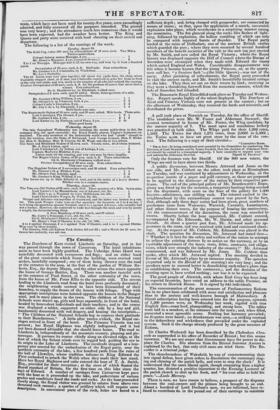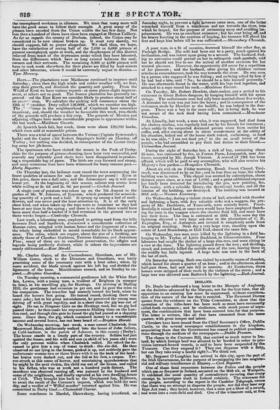A poll took place at Norwich on Tuesday, for the
office of Sheriff. The candidates were Mr. W. Foster and Alderman Steward; the contest terminated in favour of Mr. Foster, the Whig candidate, by the narrow majority of 7. The most open and scandalous bribery was practised on both sides. The Whigs paid for their 1,282 votes, 1,500/. The Tories for their 1,275 votes, from 2,000/. to 2,500/. ; the Tories stem to have set great store by the issue of the con-
test. The following is a copy of their circular-
" Committee Room.
•• DRAR Sea—It being considered most essential by the Committee for conducting the Election of Lord Stormont and Sh James Searlett, that the election of Alderman Stew- ard should be carried by a triumphant majority, I have earnestly to request your vote
"
and interest for Alderman Steward. Signed II. FRANCIS.
Only the freemen vote for Sheriff. Of the 800 new voters, the Whigs are said to have above two thirds.
A public discussion, between Messrs. Attwood and Jones on the one side, and Mr. Cobbett on the other, took place at Birmingham on Tuesday, and was continued by adjournment to Wednesday, on the respective merits of a paper and gold currency, as these are proposed to be applied to the distresses of the nation by their respective par- tisans. The end of the principal gallery of Mr. Beardsworth's Repo- sitory was fitted up for the occasion, a temporary hustings being erected for the disputants, with seats on the floor of the gallery for 1,300 hearers—admittance, one shilling each. The interest excited in the neighbourhood by this extraordinary contest was proved by the fact, that, although only three days' notice had been given, great numbers of gentlemen came from Worcester, Warwick, Coventry, Leamington, and other distant towns, for the purpose of hearing the controversy. At the commencement of the discussion, the room was crowded to excess. Shortly before the hour appointed, Mr. Cobbett entered, accompanied by Mr. Edmonds, Mr. W. Martin, and other personal friends. At about a quarter past four, Mr. Attwood made his ap- pearance in the room, and was received with loud and continued cheer- ing. At the request of Mr. Cobbett, Mr. Edmonds was placed in the chair. The question for discussion Mr. Attwood had stated thus- " Whether it is best for the safety and welfare of the nation to attempt to relieve the existing distress by an action on the currency, or by an equitable adjustment of the taxes, rents, debts, contracts, and obliga- tions, which now strangle the industry of the country?" Mr. Attivood commenced, and was followed by Mr. Jones. Mr. Cobbett then spoke, after which Mr. Attwood replied. The meeting decided in favour of Mr. Attwood's plans by an immense majority. The speeches (reported only in the Herald of this morning) are very long; and the speakers seem to succeed better in demolishing each other's plans than in establishing their own. The controvery, and the decision of the meeting upon it, have settled nothing; nor was it to be expected.
The good people of Alnwiek, with whom Earl Grey has been long an especial favourite, have voted an address to the noble Premier, on his return to Howick House. It is signed by 84,5 individuals.
The consummation of the great measure of Parliamentary Reform has in no place been celebrated with more real satisfaction and pleasure- than in the ancient and well.known borough of Malmesbury. A liberal subscription having been entered into for the purpose, upwards of 1,500 persons were, on Wednesday last week, regaled with true English fare—roast beef, plumpudding, and strong beer. The tables were laid in a meadow, at the entrance into the town ; and, when filled, presented a most agreeable scene. Nothing but harmony prevailed; no disputes were heard ; no drunkenness was seen,--a striking contrast to the debauchery and wickedness that prevailed under the exploded system. Such is the change already produced by the great measure of Reform.
Sir Charles Wetherell has been described by the Cheltenham Chro- nicle as superseded in his office of Recorder of Bristol; but this seems incorrect. We are not aware that Government have the power to dis- place Sir Charles. His absence from the Bristol Summer Assizes is explained by the fact, that only civil cases are tried there. The Re- corder is a criminal judge.
The churchwardens of Wakefield, by way of commemorating their late signal defeat, have given orders to discontinue the customary ring- ing and chiming of the parish bells, and even to stop the clock ! It is understood that the same liberal spirit, though emanating from a higher quarter, has dictated a positive injunction to the Evening Lecturer of the parish church to shut up his book, and " for ever after to hold his peace."—Leeds Mercury.
There is now, we have reason to believe, a prospect of the disputes between the coal-owners and the pitmen being brought to an end. About a hundred of Lord Durham's men we are informed, have re- fused to contribute 6s. in the pound out of! their earnings to maintain
the unemployed workmen in idleness. We trust that malty more will have the good sense to follow their example. A great many of the pitmen have seceded from the Union within the last few days. Not less than a hundred of them have since been engaged at Hetton Colliery. As far as regards the county of Durham, indeed, the -Union may be considered to be now almost broken up. It muet very shortly, we should suppose, fall to pieces altogether. We shall then, we hope, have the satisfaction of seeing half of the 7,000 or 8,000 pitmen at present unemployed, again at work, and the shopkeepers of this district relieved from much of the depression under which they have laboured, from the differences which have so long existed between the coal- owners and their servants. The remaining 3,000 or 4,000 pitmen will have to seek work elsewhere, for their places are filled by lead.miners and other labourers, whom it would be extremely unjust to dismiss.— Tyne Mercury.



























 Previous page
Previous page